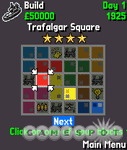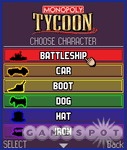Monopoly Tycoon is fun, but it's far too easy, and for a game with two such impressive words in the title, the stakes are surprisingly low. In Monopoly Tycoon, you play for one of four objectives against two computer opponents. Although based on the board game Monopoly, this game is more strategically oriented, where the purpose is to capitalize on property values and create corresponding businesses by outthinking your opponents' building strategies. The problem with this is that too much of your enjoyment is dependent on the AI, and it won't take many rounds of Monopoly Tycoon before you'll be able to consistently win. Without varying AI difficulty levels, the ability to play against human opponents, or a cumulative scoreboard, Monopoly Tycoon falls short of providing long-term entertainment. If only being a real tycoon were this simple.

After picking from a selection of six classic board game pieces, your first task is to select one of four scenarios to play, including: net worth 10 days and net worth 30 days, which task you with competing for overall value in the specified time limit, through cash, property investment, and businesses; most cash, which simply calculates how much profit you've made at the end of 20 days; and sales of 1000, which is based on how much merchandise you can sell through business outlets. Once you've hit 1000, you've successfully beaten the game. The problem with all four of these scenarios is that there's a specific method to beating all of them, and the AI doesn't seem to understand it. Once you figure out what you need to make the most of the objective, the game is quite simple.
The game consists of the 28 property squares plus two additional utilities, rounding off the total at 30. At the start of each game, players will be randomly assigned one property, which they can begin building on immediately. On each square, you're given up to three places to position your building, and you can glance at block statistics to determine what type of establishment is most necessary. From there, you can create a two-story, four-story, or six-story building that is of low, medium, or high quality. However, the larger and nicer you go, the more money it will cost you. It's most efficient to start off modest and work your way up once the money starts coming in. After building, you can explore what your opponents are doing, or go on to the day's total, which will calculate all three players' income and expenditures for the day and tally it up on a scoreboard.
The next day, a randomly selected property will be up for auction, and you must outbid the other players or drive up the price so that they're paying higher for it. Even if there is property available on which the utilities or railroads are located, you can't build on it. All you can do is collect the money that the properties generate. If you monopolize either the utilities or the railroads, your total earnings will be exponentially larger than if you merely own one or two, just as in the board game. After you've met the game's requirements or the allotted time has passed, the game is over and a winner is declared. Each round you play is separate from the others, which means that you can't keep a running total. Since you can't play against human challengers or change the AI difficulty, the game quickly becomes boring once you've figured out how to beat the given computer opponents.

The graphics on the Motorola V551 are good for this type of game. They're fairly faithful to the Monopoly pieces, and they add a little more detail when you go in and see 3D renderings of each neighborhood. The sound aspect of the presentation doesn't fare so well. The theme song on the menu screens is well done but a little over the top, and it's only surpassed in its gregariousness by the sound effects that ring incessantly throughout the game. You'll do well to turn them off. Otherwise, the game is fairly easy to control and navigate, and the included information boxes are a very helpful guide for new players.
Had there been more of an effort to include varying difficulty, this could have been a fairly good game. However, as it is, it can only be recommended for those with no tycoon instincts whatsoever. If you're in the market for some beginner-level tycoon gaming, this game might be worth a look. Otherwise, just pass Go and keep your money.